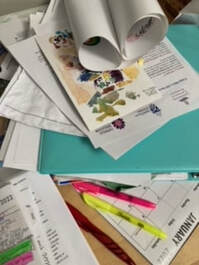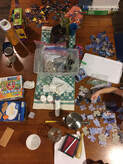 This semester, I gave my online students a new assignment. A Hmm… Collection, which I adapted from Doren and Millington (2019). I asked my students to collect and document 10 objects from their work spaces and reflect on the objects as well as the process. Halfway through grading their responses, I decided that it was only fair to do the same assignment as a way for them to get to know me a little better. Two collections emerged. The first, I realized, was something I began years earlier in the pedagogy of the home post, documenting the mess of my overlapping spaces of work, homeschool, artmaking and play.
0 Comments
And yet, perhaps one of the benefits that homeschool offers is NOT labeling activities, topics, projects as art. Or science. Or language arts. Or social studies. Or math. Perhaps just learning about things and how to do things as they are (rather than in the confines of a subject) has value.
In a research class I teach, many students describe the similarities between the action research methodology and design thinking. Or good teaching practice. Or community organizing. Or other discipline-specific thinking processes. And I say, of course. Yes. We’re simply using different words to describe the same thing. One student has been pushing back – why even bother calling it research? (And of course that question is rooted in the historic inequalities of academic research, but isn’t defining a field always rooted in keeping people out and raising some people up into positions of power)? So, this creature. The one that she spent over an hour putting together and thoughtfully placed in the guest room. What “objectives” did it meet? Or, the game that my son made up last week, spending hours setting up a new game board using the pieces of an existing game, and making up rules for how it works, blending together narrative and objectives from other video and board games and books he’s read? Or, the hours spent on imaginative play? Or, the projects I do plan on big topics like China that take on a life of their own – focusing more on reading aloud a novel that brings together the myths, beliefs, and symbols, making sense of some of the history we read about and all those things giving important context for popular culture like Disney’s Mulan? (Yes, we're back to China again. The kids love eating dumplings, and we always try new recipes and visit restaurants when we study other cultures. Isn't that a good enough reason to learn more about something?) My research in education self struggles against and within what I know/have learned as a homeschool parent. The challenge is creating spaces to document, learn from, and better create educational opportunities for my kids and my students from all these different spaces.  Many people are starting a whole year of homeschool for the first time. After the scramble of the spring and what seemed like a jump off the deep end into doing (online) school at home, the idea of having more control over what we learn and probably more importantly how school happens was more appealing than trying to navigate changing and last minute decisions, hybrid, online, A group and B group. I get it |
Ruth M. SmithCommunity arts educator and researcher. Drinking coffee. Home educating. Making art. Listening intentionally. Categories
All
Archives
February 2022
|

 RSS Feed
RSS Feed
